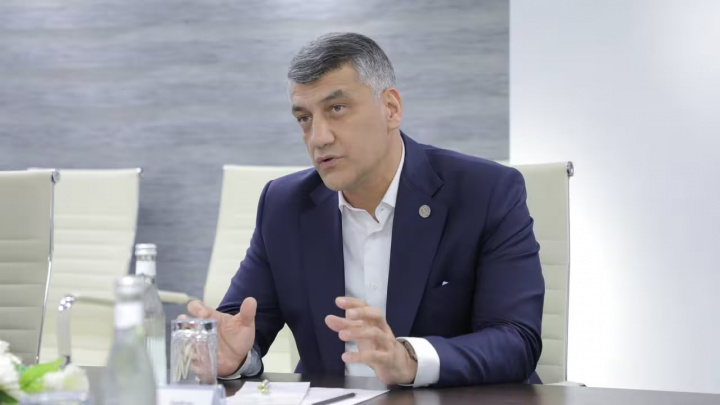Why speak Russian in Uzbekistan — and not Uzbek? Tashkent café incident reignites debate on language use in public service
A blogger who entered one of Tashkent’s coffee shops criticized the staff for addressing him, an Uzbek customer, in Russian, despite them being Uzbek employees. This incident, which the blogger shared in a video, has ignited widespread online discussions about the frequent lack of service in the state language at retail and service establishments.

Photo: Getty images
The incident involved Hojiakbar Nosirov, a blogger known by the pseudonym "Activist." In a video posted on his Instagram, he recounted the experience as follows:
“Today, I went to ‘Bon!’ to get a cappuccino. As I stood at the counter, there was an Uzbek girl there. She asked me, “что будете заказывать?” (‘What would you like to order?’). At first, I was caught off guard, but to respond quickly, I said “маленький капучино” (‘A small cappuccino.’)
“I kept looking at her — she’s Uzbek. Then she asked me again, “еще что нибудь желаете?” (‘Would you like anything else?’) in Russian. So, I said, ‘Look, you are Uzbek, right?’ She replied, ‘Yes, I’m Uzbek.’ I said, ‘I’m Uzbek too, you can see that, so why are you speaking to me in Russian?’ She paused, thought for a moment, and then asked, ‘Do you need anything else?’ I said, ‘No.’ I think she felt a little embarrassed.
“Later, while I was waiting for my coffee, another woman — Uzbek, I believe — came up and asked, “что вы заказывали?” (‘What did you order?’) in Russian. I just stared at her without answering, and she went on, “маленький капучино, да? Вот ваш заказ” (‘A small cappuccino, right? Here’s your order,’) and placed it in front of me before walking away.
“The issue here isn’t just her behavior — it’s the bigger picture. We’re in Uzbekistan. You can see that I’m Uzbek, you’re Uzbek, so speak to me in Uzbek. I’m not saying don’t speak Russian at all. But your business isn’t built on the Russian language or in Russia, right?
“Some might say this is a trivial matter and wonder why I’m making a fuss. Let me explain: this is a very important issue. Businesses like this contribute to the erosion of the Uzbek language. On top of that, companies like these demand Russian proficiency from people who know Uzbek and want to work in Uzbekistan. Ninety percent of their customers are Uzbek — so why make all their staff speak Russian? Where’s the logic?
“Another significant and unfortunate aspect is that, while they’re helping diminish the Uzbek language, if a customer who doesn’t speak Russian comes in to place an order and they’re questioned in Russian, that customer might feel ashamed for not knowing the language. It shouldn’t be that way — it should be the opposite. Those asking questions in Russian to an Uzbek person should be the ones feeling ashamed. That’s why, if they won’t speak Uzbek, maybe we shouldn’t buy their stuff. How many people who haven’t learned Russian, despite knowing Uzbek in their own homeland, are stuck unable to find work because of this?” the blogger stated.
In the comments below the video post, the administration of “Bon!” apologized for the incident, stating that the company recognizes the status of Uzbek as the state language and would take measures to prevent such occurrences in the future.
Hojiakbar Nosirov’s video garnered over 210,000 likes and more than 22,000 comments within five days, making it the most discussed topic in the Uzbek segment of the internet in recent days.
Online users highlighted the relevance of the issue, noting that in some retail and service locations, Russian is the primary language of service, which can make Uzbek-speaking locals who don’t know Russian feel uncomfortable.
“Once, when I went to ‘Bon!’ with my friend, I got distracted by my phone for a moment. The cashier spoke to my friend in Russian, and since he doesn’t know Russian, he felt a bit awkward,” one user commented online.
“You’re 100% right. Knowing Russian is a foreign language skill — it’s great to know and speak it. But businesses in Uzbekistan should first provide service in Uzbek. Then, they can adapt to the customer’s language preferences,” wrote another user.
“When I go to some of our more expensive restaurants, they greet me in Russian. Even though I know Russian, I keep speaking Uzbek. You can tell it annoys some of them — I can sense it. I don’t do it because I don’t know Russian; I do it so they’ll respect our language and prioritize it,” emphasized another commenter.
“This is a very important topic. I’ve been to many foreign countries, and in every one, their own language takes priority. Wanting to speak your own language in your own country isn’t disrespect toward other languages — it’s concern for the future of your mother tongue,” said another comment.
“Learning and knowing languages is only beneficial, but not knowing one shouldn’t harm you in your own country, especially in everyday matters like shopping. I had a similar experience in a clothing store. When I spoke Uzbek to my friend, the salesgirl came over and asked in Russian, “вы точно купите?” (‘Are you definitely going to buy?’) I responded to her Russian greeting in Russian, and everything was fine until I spoke Uzbek. In the end, I put the item down and left,” recalled another internet user.
In a number of comments, it can be observed that Hojiakbar Nosirov has been insulted and accused of inciting conflict between nationalities.
“Some people are abandoning the issue Hojiakbar raised and instead attacking his personality, which is surprising. Let’s maintain balance — there’s no question of eliminating any language. If you say there should also be communication in Uzbek, they grab you by the collar and see it as a threat, our own compatriots,” said blogger Mirzayor Erkinov.
Blogger Dilshod Hoshimov approached the matter from the perspective of consumer rights. He reminded readers that, according to the Constitution, Uzbek is the state language and referred to the laws “On the Protection of Consumer Rights,” “On the State Language,” and “On Advertising.”
“You are a consumer. As a consumer, you have the right to demand service in Uzbek. If a restaurant cannot provide you with a specialist who speaks Uzbek, the problem lies with the restaurant, and your rights have been violated. Secondly, according to the law, cafés and restaurants are required to present their menus, labels, and price lists in Uzbek. Only after that do they have the right to translate them into other languages.
“Last year, when the Competition Committee inspected 700 cafés and restaurants, 75 percent of them were found to lack menus in Uzbek. This is a deeply regrettable situation,” said Dilshod Hoshimov.
Some activists participating in the discussion did not outright reject Hojiakbar Nosirov’s views but criticized him for speaking in a hateful tone and chasing publicity.
“We should approach the language issue not through radical nationalism but through liberal patriotism. My opinion on ‘Activist’s’ statement is that I don’t condone his tone or the way he structured his message. With anger, an ‘attack’ approach, and a hateful tone directed at individuals, he turned even his valid points on the language issue into something controversial. But if we strip away the tone and emotions and look at the core of his statement, ‘Activist’ is right,” said philologist Shahnoza Soatova.
“Of course, raising the issue is important. But how it’s being raised matters just as much. Nowadays, the language issue is a sensitive topic in our society, and unfortunately, cases of stirring hatred and dividing people through this topic are increasing. In such a situation, individuals with large audiences need to approach it responsibly, serving to foster understanding and explanation, not to generate hype. Hype attracts attention, but it doesn’t solve the problem,” wrote lawyer Kamola Alieva.
The incident also reverberated in the marketing sphere. For example, another restaurant chain, “Kofteci Ramiz,” posted a story on its Instagram page saying, “We don’t have ‘coffee’ — we have ‘qahva’ [Uzbek for coffee].” According to activists, following the uproar, “Bon!” began including Uzbek in its Instagram stories as well. “It would be good if other brands also gradually started maintaining this balance,” said blogger Mirzayor Erkinov.
Two days after “Activist” posted the aforementioned video, the Competition Committee announced that, based on one of the objections raised on social media, a formal request had been issued to the “MADO” restaurant in Tashkent. It was noted that, at the demand of the consumer rights protection agency, the restaurant and its branches had provided customers with menus in the state language.
Related News

11:59 / 29.05.2025
AI starts speaking Uzbek dialects with human-like accuracy

17:05 / 13.05.2025
Alisher Kadirov: Promoting Soviet nostalgia in schools poses a national threat

16:34 / 24.04.2025
Uzbekistan mandates Uzbek language finals for all graduates

15:43 / 24.04.2025



